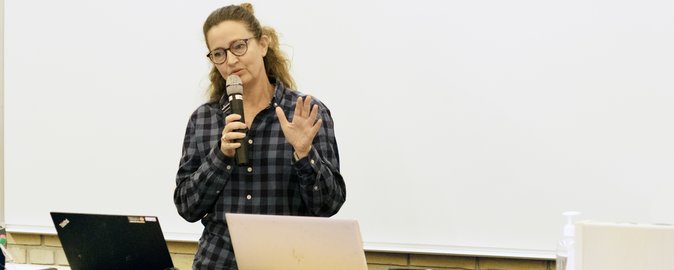- Education
-
Research
Current research
Talent
-
Collaboration
Businesses
Government agencies and institutions
Alumni
-
About AU
Organisation
Job at AU
A half-hearted application is not going to cut it if you are to have any hope of securing a grant from the Innovation Fund Denmark. A precise and easy-to-understand project description and a detailed implementation plan are the key elements, according to two researchers from Aarhus University who have previously received grants.
2021.12.10 |

Lisbeth Frostholm recieved a grant from Innovation Fund Denmark in 2018 for an application for patients with undiagnosed symptoms. Photo: Jakob Binderup
Last Thursday, all researchers who have had a project grant application rejected or are considering submitting an application could find some help.
At one of a number of events held by AU Health, focus was this time on the Innovation Fund Denmark, a foundation that makes grants totalling hundreds of millions of Danish kroner annually to support research and development within healthcare and other areas.
The objective was to help potential applicants in the best way possible by focusing on what to aim for and the pitfalls to avoid in all phases of the application process.
Professor of health psychology Lisbeth Frostholm and PhD and Clinical Associate Professor Christian Lodberg Hvas – both from the Department of Clinical Medicine – were invited to the meeting to share their experiences of the application process.
Lisbeth Frostholm has twice – in 2016 and 2017 – had applications rejected by the Innovation Fund Denmark, before finally succeeding together with a colleague from SDU in 2018 and receiving a grant of DKK 9.4 million to develop a digital application for patients with persistent undiagnosed symptoms.
In 2018 Christian Lodberg Hvas received a grant of DKK 17 million from the foundation for a research project that aims to help make so-called faeces transplantation a standard treatment at Danish hospitals.
Below you can find the best advice from the two researchers for anyone considering applying for funding from the Innovation Fund Denmark:
The Innovation Fund Denmark's Investment Officer Marlene Fredborg also participated in the meeting, and she agreed with the researchers' observations that the applications should be so detailed, specific and precise that everyone – regardless of background – should be able to see the perspectives in the project.
She also had some additional advice for potential applicants:
Marlene Fredborg also explained the formal requirements which the applicants must meet.
In general, the Innovation Fund Denmark focuses on interdisciplinary research and innovation which creates new solutions to society’s biggest challenges.
The foundation's investments contribute to e.g. new knowledge and the development of new healthcare and welfare technology, as well as improvements in prevention and treatment within the healthcare sector.
In addition, the foundation's investments may contribute to strengthening clinical research that contributes to, among other things, personalised medicine, the digital health field, artificial intelligence and increased virtual and technological application in connection with clinical trials.
The foundation's grants can cover up to 75 per cent of the project’s total costs and 44 per cent of overheads.
According to Marlene Fredborg, "interdisciplinary" is a keyword for the foundation, which has a mission to strengthen collaboration and partnerships between researchers, entrepreneurs and companies with the purpose of creating value and jobs.
She emphasised that it is important for applicants to describe partnerships with other professionals whose expertise is necessary to implement the idea.
Applications are generally assessed on the basis of the following three parameters:
If you need help with the application, then the Innovation Fund Denmark is ready to help.
The same is true of the Research Support Unit, which was represented at the event by Administrative Officer Aisha Rafique.
Here, applicants can get help with the following:
The next deadline for applications to the Innovation Fund Denmark is 5 April 2022.
Vicedean, AU Health
Phone: +4540293389
Mail: boetker@au.dk